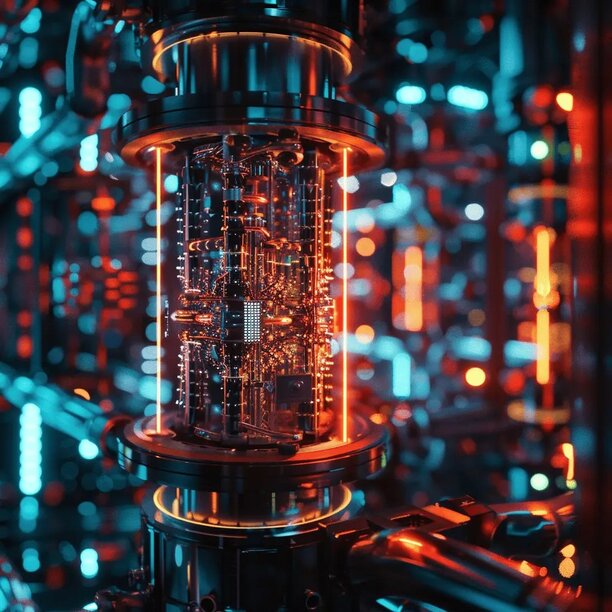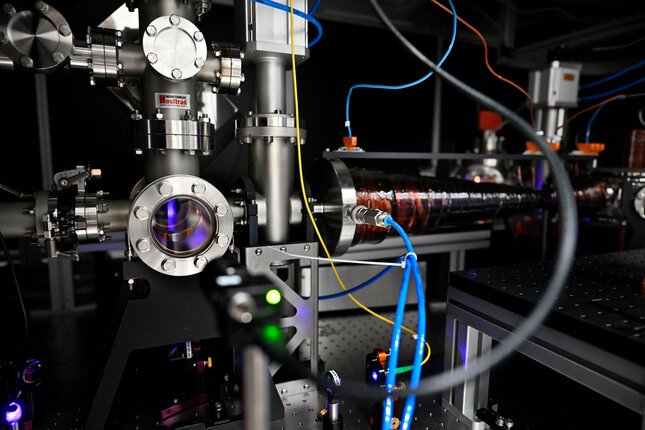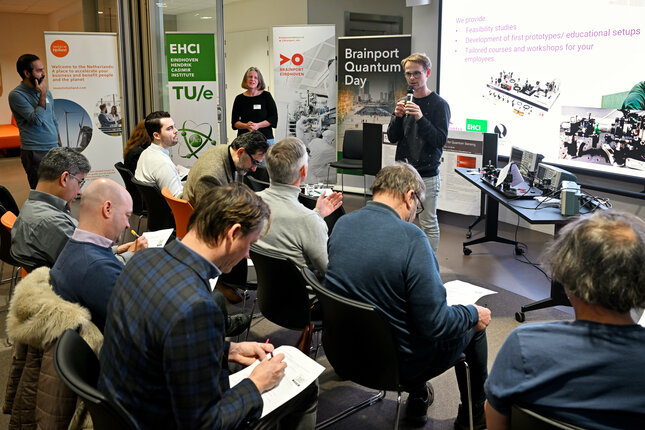Complex calculations and unprecedented speeds: in our data-driven society, quantum computers promise major advances. At the Eindhoven Hendrik Casimir Institute (EHCI), intensive research is being conducted into photonics and quantum technology applications. We speak with program manager Gijs Hijmans about an exciting year ahead. "Quantum computers 'made in Eindhoven' will advance society," he says.
Source: IO+ / Elcke Vels
Quantum technology is not something easily explained at the kitchen table. Yet as Program Manager Quantum Tehcnology at TU/e-institute EHCI , Gijs Hijmans has become very adept at it. He constantly informs companies and organizations about this branch of science, and especially about its promising applications in society.

The technology, he explains, uses the principles of quantum mechanics: it deals with the properties of the smallest particles in the universe, such as electrons and photons. "Instead of the binary 'bits' that traditional computers use (which can only take the values 0 or 1), quantum computing works with qubits," he said.
"A qubit can be simultaneously 0, 1, or a combination of both due to the principle of superposition. In addition, qubits can cooperate via entanglement." The result: quantum computers can perform certain calculations much faster than classical computers.
2025: the year of quantum technology
The United Nations has declared 2025 as the International Year of Quantum Science and Technology (IYQ) . This year, exactly 100 years after the birth of quantum mechanics, will be celebrated worldwide with activities aimed at increasing public awareness about the importance of quantum science and its applications.

Quantum technology is on the rise
Increasingly, companies and agencies are using the technology. Think of an application such as quantum navigation for aircraft or ships, or quantum sensors and gravity measurements. Another emerging application can be found in health care. Protein folding is a process that is very difficult to compute.
This is crucial for medical research to understand how drugs interact with specific proteins to achieve desired effects. Says Hijmans, "I remember, when I was 16, running a program on my home computer to help calculate how proteins fold. My computer was part of a global network."
At the time, this was still done with a "normal" computer and limited computing power. The potential of quantum computers, however, goes much further. "In the future, although that may take another 50 or 100 years, you could, for example, compute entire sets of proteins.
Imagine this: a patient with a specific disease could be given a drug completely tailored to his or her genome. The quantum algorithm will calculate how that drug interacts with the protein, with no side effects on other proteins in the body. Although this is future science, it shows what is possible with quantum technology."

Eindhoven quantum computer goes online
Quantum technology is still in a relatively early stage of development. Thus, quantum computers are not yet powerful enough for large-scale commercial applications. Moreover, they are sensitive to noise and errors.
But, exciting things are about to happen at EHCI this year that should change that. Hijmans: "We are currently building a neutral atom quantum computer. This works with atoms held in place with lasers. So we are not going for the most qubits but for the best control. We've been working hard on this technology for the past few years, and early this year the computer will go online."
It will be connected to Quantum Inspire: a project in which Dutch quantum computers will be operated in the same way: via the Internet. In Delft, for example, superconducting and spin quantum computers are also connected.
All these different types of computers have their advantages and disadvantages. Superconducting computers now have on the order of 100 qubits, while neutral atoms have many more (1000s in commercial systems). So currently neutral atoms are winning the race. But the race is certainly not over, Hijmans says. "There are challenges in both technologies and competitors are lurking."
A European network
Ambitious plans are also being realized at the European level by 2025. The European Commission is working with the 27 EU member states and the European Space Agency (ESA) to develop EuroQCI . This network works with Quantum Key Distribution (QKD). This is a technique for sharing keys securely via quantum mechanics.
This protects data from quantum hacking: cracking encryption using super-powerful quantum computers. The network will protect sensitive data and critical infrastructures by integrating quantum-based systems into existing communications networks. This will ultimately strengthen the protection of European government institutions, data centers, hospitals, and energy networks.
"Ultimately, we want to create a secure quantum link from capital to capital in Europe," Hijmans explained. The call is now open to realize the international links. We may see the first international links this year. Eindhoven, too, will eventually be connected.

Quantum in the Brainport region
In Eindhoven, there is already plenty of research being done on secure connections. In recent years, EHCI has done extensive research with the testbed for Quantum Key Distribution (QKD). Hijmans: "Eindhoven has a focus on the industrialization of such connections. To help industry, we are establishing connections around Eindhoven and a connection has already been made to nearby village Waalre."
For example, hardware developers can test new techniques, see how quantum connections function in the real world, or work on integrating them into normal networks.
Connection providers are also covered: "We have quantum equipment from different providers at our disposal. So Internet providers can see what fits best in their network and develop their network with us so that it works well and is secure."
A century of developments
One thing is certain: in the past decade, quantum technology has made great strides. More and more devices using this technology are now available. The widespread use of quantum computers is still some time away. "But this year we will in any case be taking big steps here in Eindhoven to make the technology more widely applicable," concludes Hijmans.






